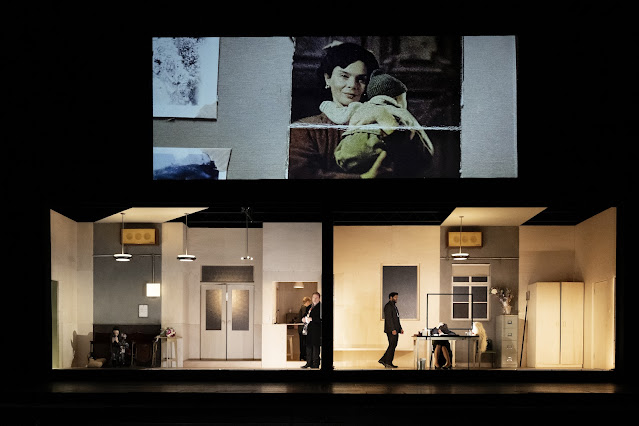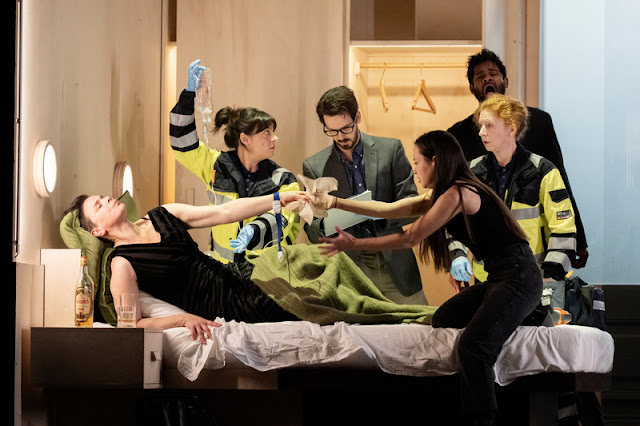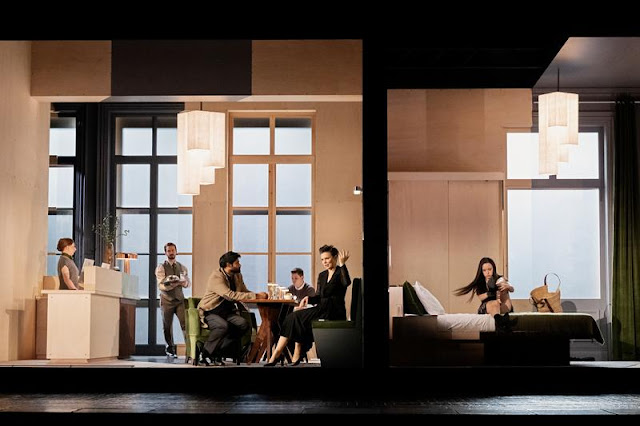 |
| Janácek: The Makropulos Case – Act 2: Heather Engebretson, Susan Bickley, Jenry Waddington, Sean Panikkar, Ausrine Stundyte – Royal Opera (Photo: Camilla Greenwell/Royal Opera) |
Leoš Janáček: The Makropulos Case; Ausrine Stundyte, Heather Engebretson, Sean
Panikkar, Johan Reuter, Henry Waddington, Peter Hoare, Daniel Matoušek, Alan Oke, director Katie Mitchell, conductor Jakub Hrůša; Royal Opera, Covent Garden
Reviewed 7 November 2025
Covent Garden’s first Makropulos Case in a fascinating yet distracting and too-complex production that is redeemed by strong musical performances including a mesmerising account of the title role
Leoš Janáček’s The Makropulos Case (Věc Makropulos) made its debut at the Royal Opera House this week, nearly a century after the opera was premiered in Brno in 1926. The production represented director Katie Mitchell‘s avowed final opera production, as well as being Jakub Hrůša‘s second new production as music director (and his first new production of a Czech opera).
We caught the second performance at Covent Garden on Friday 7 November 2025. Directed by Katie Mitchell with designs by Vicki Mortimer and Sussie Juhlen-Wallen, lighting by James Farncombe and video by Sasha Balmazi-Owen, Jakub Hrůša conducted. Ausrine Stundyte was Emilia Marty, Heather Engebretson as Krista, Sean Panikkar was Albert Gregor, Johan Reuter was Prus, Henry Waddington was Kolenaty, Peter Hoare was Vitek, Daniel Matoušek was Janek, Alan Oke was Hauk-Sendorf.
If you asked, many people familiar with the opera would probably say that its biggest problem was in Act One when Janáček rather gets bogged down in the Jarndyce-v-Jarndyce-like case. It can be tricky to work out who is whom amongst the men (with three lawyers, two litigants plus the son of one) and audiences need some help. You cannot help feeling that Janáček could have done with a figure in the opening scene like Ferrando in Verdi’s Il trovatore or Gurnemanz in Wagner’s Parsifal, both of whom summarise the plot so far!
 |
| Janácek: The Makropulos Case – Final scene: Austrine Stundyte, Heather Engebretson – Royal Opera (Photo: Camilla Greenwell/Royal Opera) |
But according to the programme book, the biggest problem for Katie Mitchell is the opera’s ending. Why does Emilia Marty (now revealed as Elina Makropulos) hand the formula for eternal (well 300 years) life to Krista, a young woman whom she barely knows. Mitchell’s solution is to add an extra layer to the plot, an affair between Emilia Marty and Krista so that Rosenkrantz and Guildenstern-like, Mitchell crafts an entire plot within the cracks of Janáček’s existing opera. She does so via a device which is by turns fascinating, distracting and frustrating.
Above Vicki Mortimer’s set, which comprised of a sequence of rooms with things happening simultaneously in typical Mitchell style, there was an image of a smart phone (or two) with exchanges of text messages between Krista, Emilia Marty and Janek (Krista’s boyfriend). This meant that in the opening scene of the opera, we had something of information overload. At one point there was Emilia Marty, Albert Gregor and the lawyers in the hotel lobby, along with Janek (who was seemingly unknown to them despite being the son of Prus, the other litigant in the case) who sat completely separate, and then there was Krista left in Emilia Marty’s room. Whilst those in the hotel lobby (barring Janek ) discussed the case and Marty’s knowledge of events some 100 or so years ago, Krista raided Marty’s room, discovered all sorts of historical artifacts which rather gave the game away about Marty’s age, and kept up a constant stream of text message and photos to Janek. The writer of these was Lucy Wadham. Then above this was the surtitles, provided by Martina Parker.
If you concentrated on Katie Mitchell’s absorbing new plot, then the complex discussions of the case and Janáček’s music almost merged into the background. Thankfully, things were not so overloaded again, but Mitchell still relied on the device to the detriment of our focus on Janáček’s music.
Mitchell has an avowed feminist intent in the production, the interview with her in the programme book is called A Feminist Reality Check. But it seems to me that alongside this, Mitchell has an innate distrust of opera’s grand gestures. In Donizetti’s Lucia di Lammermoor at Covent Garden [see my review], the production undermined both the mad scene and Edgardo’s great final aria by adding distractions elsewhere on stage. Something similar happened, I understand, in her production of Handel’s Theodora at Covent Garden [saee Claire Seymour’s review on OperaToday.com]. In The Makropulos Case, Ausrine Stundyte delivered Emilia Marty’s final renunciation huddled in bed to the side of the stage surrounded by the emergency services, her face almost invisible.
What lifted the production was the quality of the musical performance. Stundyte was astonishing as Emilia Marty. Poised and stylish at first, she was by turns skittish and vulnerable, always changeable and always fascinating. There was something edgy about her too, a sense of perhaps violence or having no innate care for other human life or emotions. Stundyte made her vulnerable, and prone to extremes. Mitchell had clearly mined the libretto, and a couple of Marty’s throw-away lines about the number of bastards she must have left behind and her lack of care for her young were really highlighted. But whatever Marty was doing or saying, Stundyte was always mesmerisingly watchable. She had the vocal command for the role, yet a sense of elegance to the line and for all the distractions, her final scene was musically astonishing.
Sean Panikkar was an elegant Albert Gregor the laser focus of his line really benefiting the music, giving it heft, whilst his vocal style matching his stylish appearance. Yet he was also vicious and violent, with this made all the more disturbing because the production made us realise early on, well before Emila Marty admitted it, that he was her multiple-great grandson! Johan Reuter made a strong Prus, the other surviving litigant in the case. Alternately fascinated and repelled by Marty, yet also with the upper hand because he has the papers she needs. Henry Waddington and Peter Hoare made a strong double act as the lawyers. And one of the virtues of the performances was the way Reuter, Waddington and Hoare managed to create distinctive visual and vocal characters so quickly, helping us distinguish them.
As Janek and Krista, Daniel Matousek and Heatther Engebretson had far more stage time than the composer envisaged, but the two managed admirably in the way they participated in Mitchell’s extra plot. Alan Oke was wonderfully vivid as Count Hauk-Sendorf. Here confined to a wheelchair, this certainly did not impeed him in any way: Oke crafted a vivid character out of very little. The supporting roles were strong with Susan Bickley as rather a luxuriously cast stage door woman, Jeremy White as the security guard and Jingwen Cai as the Hotel Maid.
 |
| Janácek: The Makropulos Case – Act 1: Sean Panikkar, Daniel Matousek, Ausrine Stundyte, Heather Engebretson – Royal Opera (Photo: Camilla Greenwell/Royal Opera) |
The production had a bizarre fascination with the nitty-gritty of life. We saw Emilia Marty’s hotel bathroom with people using it, including Sean Panikkar’s Albert Gregor taking a piss (with his back to us, thankfully), as well as some pretty graphic sex both heterosexual and lesbian. And there was an intimacy coordinator, Ita O’Brien.
Jakub Hrůša and the orchestra were on thrilling form, the sound lithe, vivid and vital. Hrůša kept the music moving, yet at times had all the time in the world. The orchestral textures were brilliantly realised with a remarkable transparency yet a strong presence and vitality.
The blog is free, but I’d be delighted if you were to show your appreciation by buying me a coffee.
Elsewhere on this blog
- James Blades: Pandemonium of the One-Man Band, James Anthony-Rose on his new music theatre piece on the great percussionist – interview
- A new solo album from British pianist, Alexander Ullman, features a thoroughly enjoyable selection of music by Edvard Grieg – record review
- Portraits of Mind: music by Ian Venables, Vaughan Williams & Butterworth in a celebration of Venables’ 70th birthday at Temple Music – review
- Small but perfectly formed: Wexford’s chamber version of Zemlinsky’s Der Zwerg still thrills and moves – opera review
- Vivid presence & engagement: Peter Whelan & Irish Baroque Orchestra in Bach’s Mass in B minor at Christ Church Cathedral, Dublin – concert review
- Il viaggio a Reims: members of the Wexford Factory dazzle in Rossini’s occasional showpiece despite moving the action to an asylum – opera review
- Deidamia: a welcome chance to catch Handel’s final Italian opera in Wexford, though the production feels a little self-indulgent – review
- Different musical accents: Le Trouvère, Verdi’s French revision of Il trovatore receives a rare outing in Wexford – opera review
- There was no closure here: four Irish women composers give voice to women of the Magdalene Laundries in Oxford – concert review
- Home








